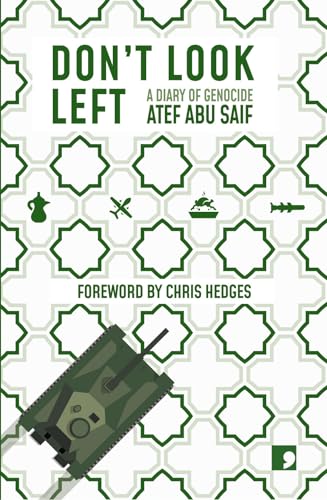Eyewitness in Gaza
Andy Hedgecock salutes the complete, unedited diaries of a man who arrived in Gaza as a government minister and ended, like most other Palestinians, living in a refugee camp

All Global Research articles can be read in 51 languages by activating the Translate Website button below the author’s name (only available in desktop version).
To receive Global Research’s Daily Newsletter (selected articles), click here.
Click the share button above to email/forward this article to your friends and colleagues. Follow us on Instagram and Twitter and subscribe to our Telegram Channel. Feel free to repost and share widely Global Research articles.
Big Tech’s Effort to Silence Truth-tellers: Global Research Online Referral Campaign
***
Rishi Sunak’s immediate response to military atrocities that have now killed 28,000 people, more than 11,000 of them children, was to tell Israel: “We want you to win.”
In October, Keir Starmer informed the Labour conference that Israel had “the right” to withhold water and power from Gaza. Interviewers on C4 and BBC failed to challenge the bellicose assertions of Israel’s British ambassador, Tzipi Hotovely. The journalists-turned-courtiers of the mainstream media are spinning acts of genocide against Gazans in terms of “Israel’s right to self-defence.” Meanwhile, the slaughter, privation and suffering continues.
Comma Press provide an effective antidote to the poison of corporate-controlled journalism in the form of an authentic voice from the front line of oppression. Don’t Look Left is a diary of devastation by Atef Abu Saif, a writer and minister for culture in the Palestinian Authority. Atef’s despatches — delivered to Comma’s Ra Page in English as WhatsApp texts and voice-memos — open with the onset of Israel’s war on Gaza on October 7 and cover 84 days of grief and courage. It’s harrowing, but life-affirming: Atef’s family and friends exhibit a breathtaking determination to retain their humanity and survive.
I would urge Alice Wairimu Nderitu, the UN special adviser on genocide who offered no criticism of Israel following the first wave of atrocities, to read Atef’s eyewitness accounts.
Inevitably, Atef reports body counts, woundings, grieving families and lives ruined by amputation or loss of sight — that’s where compassion must be directed in times of atrocity. But genocide exploits tools other than death and mutilation: the annihilation of a people requires the destruction of hope, the erasure of identity and the denial of opportunity to think of anything beyond survival.
Atef sees a pattern in the Israeli air strikes: the chosen targets are places reflecting the Gazans’ sense of self-worth, pride in their culture and belief in progress. For example, he describes an attack on the Karmel Tower, an exciting development that generated considerable investment and housed several media centres. Thriving bookstores, new housing complexes and mosques are reduced to rubble. For Atef, the message encoded in the cacophony of bombs and heaps of rubble is that any effort to make Gaza look anything but “poor and ugly” is doomed to futility.
But there is always hope, and resistance takes many forms. Twelve days into the attacks, Atef glimpses a girl in a hospital corridor, “amid all the chaos and the crowds,” quietly doing her school homework.
At the start of February, Israel accused people working for the United Nations Relief and Works Agency (UNRWA) of involvement in terrorism. This led 16 countries to suspend funds to UNRWA. It is apparent from Atef’s diary that this catastrophic decision, led by the US, will intensify suffering in Gaza. Children are educated in UNRWA schools, displaced families shelter in UNRWA welfare centres, children queue at UNRWA water stations; and the agency is even involved in rubbish collection.
Atef’s writing is precise and vivid. The facts are horrendous — 600 people died in the attacks of October 22-23 — but the terrors of displacement go beyond the numbers. There are the smells of ash, burning metal and bodies rotting in the rubble; there are the screeches, flashes and explosions of Israeli ordnance; there are splintered doors, shattered windows and twisted aluminium; and there are heartbreaking scenes in which the people of Gaza wrestle with grief, fear and a growing sense of disconnection from reality.
A father wanders streets and alleys shouting to his dead children: “Wake up kids.”His lamentations are all but unbearable. Following an explosion, Atef is unable to retrieve the bodies of his sister-in-law’s family for eight days, and then locates a nephew’s body at the top of a building 70 metres away.
Hospitals, protected by international law, are destroyed; bakeries where children queue for bread and falafel are wiped out. On the fifth day of the conflict, Atef grabs a sandwich in the souk of Nuseirat Camp; later, he notes those queuing for food on the 15th day will have died in a targeted attack.
I’m happy to report that Atef and his 15-year-old son, Yasser, have survived their trek from the rubble of their family home to reach Port Said. But, as the author notes, his thoughts remain in Gaza. His diary entry for Day 20, when the death toll stood at 7,000, posed a question we should understand as a call to action: “How many of us need to die before the world is awakened from its slumber?”
*
Note to readers: Please click the share button above. Follow us on Instagram and Twitter and subscribe to our Telegram Channel. Feel free to repost and share widely Global Research articles.

